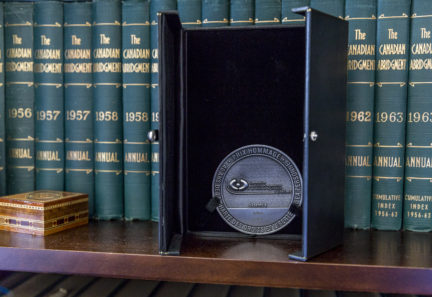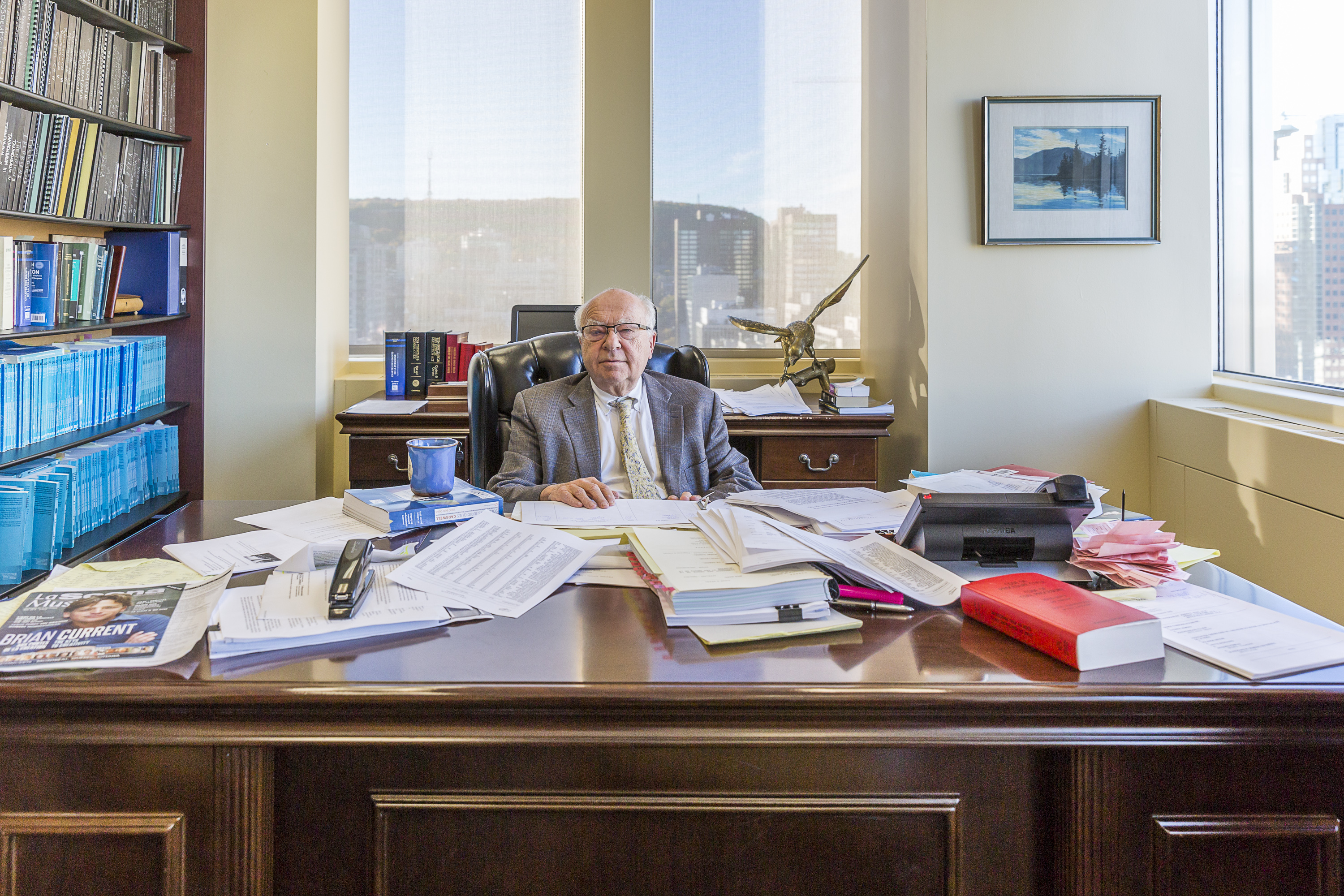This week, a Montreal woman who had been ordered by a judge to remove her hijab in court announced she is taking her legal fight to the next level. Underscoring the importance of the upcoming appeal, her lawyer, Julius Grey, told the CBC their mission is to “make sure that no woman is ever denied justice because she’s wearing the hijab, or anyone else wearing a kippa or turban.”
Grey is familiar with controversial legal battles. Born in Wroclaw, Poland, he revels in being a thorn in the provincial government’s side. When Quebec’s notorious language laws emerged, he challenged one of its most contentious parts, and won. He’s defended a comedian’s right to make fun of a disabled young man, and a woman who has accused a Liberal member of Quebec’s National Assembly of sexual assault. He’s also part of a coalition fighting Montreal’s pit bull ban.
Videos by VICE
Grey spoke with VICE News at his Montreal office in October, prior to Donald Trump’s victory, about constitutional rights, free speech and his lengthy career. This interview has been condensed.
You’ve made your career on taking the government to court. Were you always anti-authoritarian?
I’m a person who is a non-conformist. I do not accept the opinions generally held in our society are necessarily right. That means I’m prepared to challenge all sorts of things. I can challenge sacred cows including, if you look at my writings, I’ve often expressed doubts about the merits of democracy — not that I think there’s a better system to replace it. I don’t like the sacramental part of it. The word “democracy” means there’s nothing further you can do.
Nationalistic sentiment has risen in Quebec since then. What are your thoughts on that?
Although I still don’t like narrow nationalism of any sort, I think Quebec nationalism is the least objectionable of all of the ones I’ve been exposed to.
[…]
Nationalism, religious allegiance, class allegiance — all of those things that make people follow their own group at all costs are extremely dangerous. This is part of my non-conformism: I believe people should not follow their own group.

You’ve challenged elements of Quebec nationalism in court before — for example, Bill 101’s sign laws.
Bill 101 contained three things that were wrong: The justice part, the school part where other Canadians couldn’t go to English school and the signs, where commercial signs had to be in French only. Those three things were set aside. On the other hand, English Quebec nationalism didn’t see that there had to be some protection of French. I gradually moved away from that position and now I recognize that Bill 101 — except for the things that were set aside — is not a bad law.
What are your thoughts on drug control?
Is it not obvious that… it’s one of the great scandals of the world? That millions of people [in the United States] are in jail for minor drug offences and it just so happens that most of them are black? In other words, it’s a bigger offence to smoke pot when you’re black than when you’re white. The cost is tremendous. California spends more on prisons than it does on education. There aren’t enough safe injection sites. We should consider widespread legalization.
Why is Canada moving slowly on this matter?
People do not have the strength or the courage to stand up against political correctness and currently held views. I’ve always considered the most important thing about being a lawyer, and the most important thing about trying to be an intellectual — I hope I am one, but other people will decide that — is being fearless. Saying what you mean, even to the point of disobedience if the law is drastically unfair.
You mentioned conscientious refusal earlier…
An obvious example is Coderre’s recent bylaw on dogs. It says a city official can declare any dog dangerous and order the person to have it euthanized within three days.
If someone were to point to my dog and say, “I think he’s dangerous” I wouldn’t [euthanize it]. There’s no way I would do it, and I don’t care how many laws were adopted and I don’t care how democratic the system is — and therefore legislators, when they pass laws like that, should know that they’re inviting disobedience.

You’ve written previously, “It has become a dogma of modern American conservatism that judicial activism is nefarious for democracy.”
I think judicial activism is the only protection we have. The judge is the one hope for the individual caught in a populist world. You can’t get through to the politicians, you can only get through to the politicians with mass demonstrations.
Regarding the case of comedian Mike Ward and his comments about the disabled teen: What he said may not be illegal, but it was certainly very mean. Where’s the line?
Criticism can be mean, and I think society must be able to be acerbic, to be obscene. People shouldn’t care what he says about somebody. The reason why we repress information is that we’re afraid they’re going to harm the other person. But [it would be better to have a society that said], “Somebody said something, so what? So somebody depicted a sex act on television, so what? Somebody said Jews or blacks are not nice people, so what?”
That feels like the exact opposite of how things are.
I believe in the conflict between equality rights and freedom of expression should prevail. There is one exception to that: The exception is, when you’re giving out rights. If there were a right-wing government out there that said you can’t wear a hijab, or homosexuals don’t have full rights, then the courts would have to step in to protect rights.
You take on a lot of cases about religious freedom. Are you a religious person?
I’m totally secular as a person. I have no religion of any sort in my life.
Did you want to be a judge?
I did once, but I was never a Liberal — and I certainly wasn’t a Conservative.
In the past you’ve mentioned you’d consider running for office. Are you still thinking about that?
If a provincial NDP is formed — a party which is pro-French and pro-protection of French but not nationalistic, and very social democratic — I might run, to promote this type of Quebec I believe in.

How has Quebec managed to earn a reputation in the rest of Canada for being both very progressive, but also very discriminatory in a lot of ways?
Progressive and discriminatory are terms that vary from time to time. I’m secular — I don’t like belonging to communities, I no longer identify as French or English. I’m not for multiculturalism. I believe a society should develop a common culture, which doesn’t mean it should be the majority culture, but that each generation should form its new culture based on the contributions of everyone. I believe — and many Quebecers disagree with me on this — that accommodations actually help the assimilation. I believe it’s a good thing for people to wear hijabs in public schools. Hopefully their daughters won’t wear hijabs, won’t necessarily marry Muslims.
But in that way, I’m against some sort of view in that multiculturalism, diversity, is itself a good thing. I like that there’s no racism. I’d like a society that is diverse in its faces, but I’m not necessarily in favour of total diversity of culture in society [in the sense of having a community of communities]. I’m more of a Quebecer than a Canadian in that way.
More
From VICE
-

Screenshot: Square Enix Collective -

Screenshot: Archetype Entertainment -

An anti-natalist protester wears a sign calling for an end to human reproduction (Still from 'I Wish You Were Never Born') -

Andy Cross/The Denver Post/Getty Images
